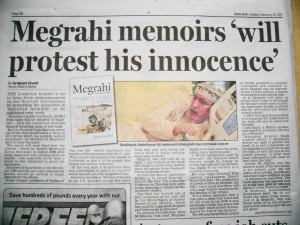The Scottish Review has recently published the following article by me under the headline The Crown case against Megrahi is about to sink without trace
Next week, 11 years after his conviction, all the important primary evidence concerning the so-called Lockerbie bomber will, for the first time, be made public. My book ‘Megrahi: You are my Jury’ will reveal crucial new facts, never available to Abdelbaset al-Megrahi’s trial court, many of which were withheld from his lawyers.
The Crown case was already holed below the waterline; now it should sink without trace. In its absence, those who assert Megrahi’s guilt will cling to two lifeboats: the first is that, regardless of the latest revelations, he was a senior agent of the Libyan intelligence service (the JSO), and therefore must have been involved in terrorism; the second is that Libya has admitted that it carried out the bombing. It’s time to scuttle these boats too.
The senior intelligence agent claim rests entirely on the testimony of Majid Gaika, an acquaintance of Megrahi’s, who was formerly a low level JSO agent and LAA’s deputy station chief at Malta’s Luqa airport. Giaka also claimed that Colonel Gaddafi was a freemason. He didn’t specify the rank – Grand Wizard of the Tripoli lodge perhaps?
At Megrahi’s trial it was revealed that Giaka had been a paid CIA informant since four months before Lockerbie and that the agency considered him so unreliable that it had threatened to stop paying him. It was not until three years later, when desperate for asylum in the US, that he finally implicated Megrahi in the bomb plot. In their 80-page opinion, the trial judges described much of his evidence as ‘at best grossly exaggerated, at worst simply untrue’, and noted: ‘Information provided by a paid informer is always open to the criticism that it may be invented in order to justify payment, and in our view this is a case where such criticism is more than usually justified’. Yet, perversely, they accepted his unsubstantiated claim that Megrahi was a senior JSO agent.
It cannot, of course, be proven that Megrahi was not an agent, however, in the 20 years since he was first charged with the bombing, no credible evidence has emerged to support the claim. The original indictment alleged that his company, ABH, was one of a number of JSO cutouts used for terrorist procurement, but, at the end of the trial, the Crown amended the indictment, dropping the wider conspiracy claims.
There is ample evidence to substantiate Megrahi’s claim that ABH was a legitimate trading company, dealing mainly in aircraft spares for Libyan Arab Airlines (LAA). He admits that he sometimes travelled on a false passport, but insists that it was issued to give him cover when he was buying spare parts for the airline’s US-made aircraft, in breach of US sanctions (in contrast to his original passport, which gave his occupation as flight dispatcher, the false one gave it simply as ’employee’). Crucially, he kept it for 11 years after the bombing and handed it over to the police before the trial – hardly the actions of an intelligence agent, let alone a terrorist.
The documents in question were in fact a US state department press release, issued when Megrahi was first indicted 18 years earlier. Had there been any evidence to substantiate the claim, it would have been used at his trial, but,
of course, there wasn’t.
Following his return to Libya, the Sunday Times ran two articles which apparently bolstered the intelligence agent claim. The first, on 29 November 2009, claimed: ‘The Lockerbie bomber was implicated in the purchase and development of chemical weapons by Libya, according to documents produced by the American government’. The documents in question were in fact a US state department press release, issued when Megrahi was first indicted 18 years earlier. Had there been any evidence to substantiate the claim, it would have been used at his trial, but, of course, there wasn’t. The second article, from 20 December 2009 claimed that, at the time of his conviction, Megrahi had £1.8 million in a Swiss bank account. A great story, but, as the book explains, completely untrue.
More recently, ITV’s ‘Tonight’ programme broadcast an interview with Libyan official Ashur Shamis, described as an adviser to the country’s new interim prime minister, who claimed: ‘[Megrahi] is an employee of Libyan security, there is no doubt about it – of external security – and if he was told to do something he would have done it’. The programme failed to mention that Shamis hadn’t lived in Libya since 1973. Not that he was unfamiliar with intelligence agencies: in 1981 he was one of the founders of the CIA-backed National Front for the Salvation of Libya and in 1985, at the height of the US government’s covert campaign against the Grand Wizard (which has been documented by, among others, Watergate journalist Bob Woodward), became chair of its National Congress.
What, then, of the other lifeboat – Libya’s ‘admission of guilt’? In 2004 the regime formally accepted responsibility for the bombing and agreed to pay $2.7 billion in compensation to the victims’ relatives. Here too Shamis had something to say: ‘[Gaddafi] paid all this money to cover up himself…If he had no role, he wouldn’t have paid a penny, he wouldn’t have paid a penny’. As well as being illogical – how could ‘admitting’ a crime amount to a cover up? – this was a blatant distortion of the truth. Libya accepted responsibility primarily in order to rid itself of crippling UN sanctions, which had been imposed after Megrahi and his co-accused Lamin Fhimah were first charged 12 years earlier. The corresponding UN security council resolutions allowed the sanctions to be lifted only if the country admitted responsibility and paid compensation.
In February 2004 the Libyan prime minister, Shukri Ghanem, told the BBC that his government continued to protest its innocence, adding ‘We feel that we bought peace. After the sanctions and after the problems we faced because of the sanctions, the loss of money, we thought it was easier for us to buy peace and this is why we agreed on compensation’. The Grand Wizard’s son Saif al-Islam later said: ‘we wrote a letter to the security council saying we are responsible for the acts of our employees…but it doesn’t mean that we did it in fact. I admit that we played with words – we had to. What can you do? Without writing that letter we would not be able to get rid of sanctions’.
If only our own leaders had been so open about the grubby politics that have plagued Megrahi’s case.


